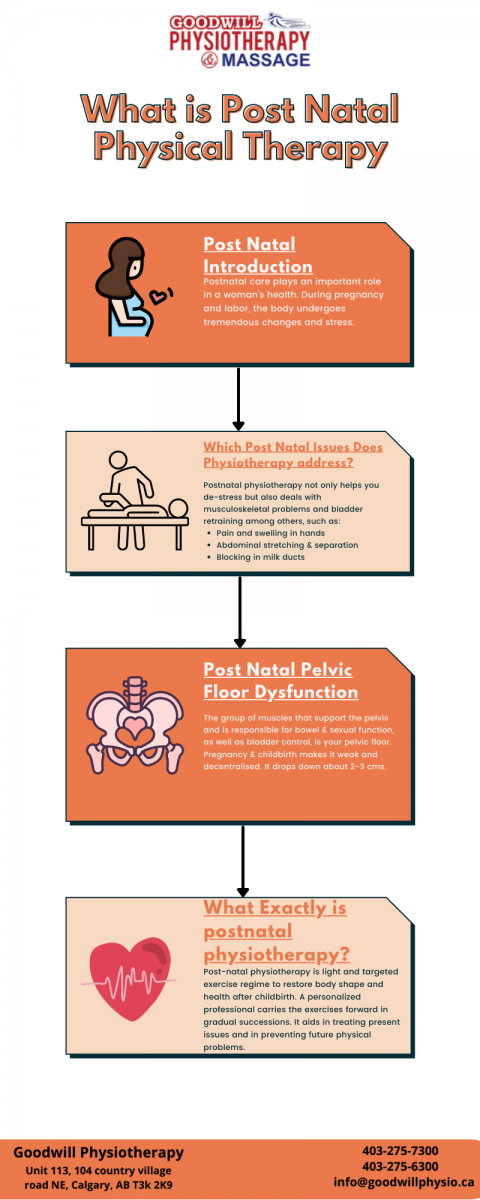A Gift for the New Mother- Post Natal Physical Therapy
Postnatal care plays a vital role in a woman’s health for the rest of her life. During pregnancy and in labor, the body undergoes tremendous change and stress.
Some of it is evident and most of it is not. Postpartum rehabilitation and restoration are very important, in and out.
Tremendous emphasis is given to massage, diet, and exercise after delivery. A midwife specially trained for the purpose is usually employed for 40 to 90 days for the new mother.
But now, due to nuclear families and busy lifestyles it has become difficult for new mothers to devote attention to this aspect.
Postnatal physiotherapy resolves the issue. At Goodwill Physiotherapy and Massage, well-designed postnatal programs are offered that bring the body to its original health and shape.
Which Post Natal Issues Does Physiotherapy address?
Postnatal physiotherapy not only helps you de-stress but also deals with musculoskeletal problems and bladder retraining among others, such as:
- Pain and swelling in hands
- Abdominal stretching & separation
- Blocking in milk ducts
- Pelvis dysfunction- the bladder and the bowels
- Back pain
- Neck and shoulders strengthening
- Pregnancy-associated osteoporosis
- Increase range of motion in joints
- Water retention
- Diastasis Recti
An advanced postpartum therapy not only eases the pains, postures, and incontinence but also brings you back in shape, strong enough to nurture the little baby.
What is postnatal physiotherapy?
Post-natal physiotherapy is light and targeted exercise regime to restore body shape and health after childbirth. A personalized professional carries the exercises forward in gradual successions.
It aids in treating present issues and in preventing future physical problems.

Post Natal Pelvic Floor Dysfunction
The group of muscles that support the pelvis and is responsible for bowel & sexual function, as well as bladder control, is your pelvic floor. Pregnancy & childbirth makes it weak and decentralised. It drops down about 2-3 cms.
The common issues handled by post-natal physiotherapy is to bring it back to its original position and enhance the muscular strength and tone. It includes strengthening exercises and electrical stimulation.
Post-Natal Abdominal Tone and Bulging Belly
What are Abs?
Your abs or the abdominal muscles are all subjected to substantial biomechanical changes and become stretched to the extreme of their elastic limit towards the end of pregnancy.
These set of muscles called the rectus abdominis, transversus abdominis and the internal and external oblique muscles play the following role:
- Support the trunk and keep the body stable and balanced
- Keep organs in the correct position
- Safeguard the spine from injury
Pregnancy shifts in the centre of gravity also reduces the mechanical ability of contraction. This results in a bulging belly. In the lower abs it causes a condition called Diastasis Recti. Although it doesn’t cause any pain in the abdominal area, it generates musculoskeletal issues.
Postnatal physiotherapy greatly helps with abs problems and abdominal separation. It provides the correct stabilization of the area with abdomen exercises that tone up and also prevent future occurrences.
Postpartum Back Pain
It’s vital to care for your back to help discourage backache and trauma. While looking after a newborn, you are straining it considerably with all the bending and lifting.
The main cause of back pain In the postpartum phase is:
- postural changes during pregnancy,
- heightened ligamentous laxity,
- hormonal effects
- reduced abs function
Physiotherapy helps resolve all these issues with back exercises, can help treat low back pain symptoms effectively with many traditional low back exercises, modal applications and modifications in movements and posture.
-Using the right kind of chair
-Nursing the baby with the right posture
-Deterring from lifting weighty objects
Back and spinal problems start in pregnancy and continue in the postpartum phase to become chronic if not handled at the right time.
Post Natal Neck and Shoulders Stress
The upper back attains a kind of rounded shape when you are carrying a child. A lot of weight is centred along the belly, and the breasts increase in size and weight too. This affects posture and puts strain on the shoulder and neck muscles.
Delivering the baby does not necessarily restore posture but becomes faulty due to habit. Post natal PT is aimed at reducing pain, restoring balance, advice on modifying routine activities and strengthening the right muscles.
Your health is important
Our Post- natal (and also prenatal) programs at Goodwill Physiotherapy & Massage include customized expert massages and assisted exercises by trained therapists. Every new mother must give herself this gift for the one time that she delivers a child.
